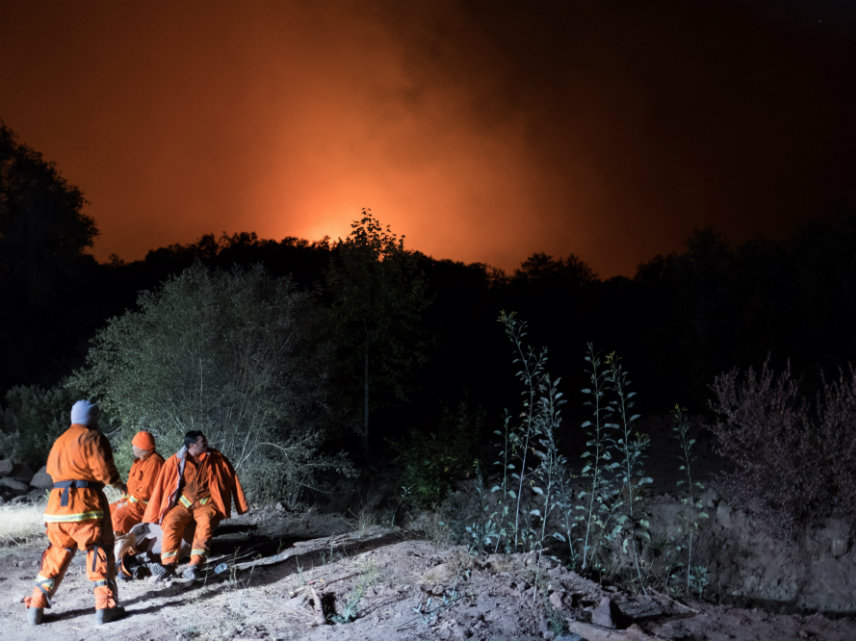There Are 200 California Inmates Fighting the Camp Fire. After Prison, They Likely Won't Be Allowed to Become Firefighters
California's licensing laws mean inmates can risk their lives for less than $2 per day, but can't earn a living after they get out of prison.

About 200 inmates are among the thousands of firefighters still doing battle with the massive wildfire that has destroyed the town of Paradise, California, and killed at least 31 people.
Once they are released from prison, however, most of them will be prohibited from joining the fire crews that they currently work alongside. It's a cruel irony that demonstrates just how difficult life can be for the formerly incarcerated—even those with needed, practical skills—who continue to be punished long after they have paid their debt to society, and bad policy that effectively prevents the state from calling upon well-trained, experienced firefighters when wildfires erupt.
According to local media reports, there are 200 inmates from 16 different fire crews helping fight the dangerous Camp Fire, which is now the deadliest and most destructive wildfire in the state's history. As of Monday morning, the fire had burned more than 113,000 acres and was only 25 percent contained. There are also inmate firefighters helping to battle two blazes in southern California, including one that has burned the set of Westworld and prompted an evacuation of Malibu.
Those inmate fightfighters are volunteers who earn $2 a day, and $1 an hour when fighting an active fire, while working alongside professionals who get paid an average of $74,000 per year. Those significant cost savings are part of the reason why convicts can account for up to half of the firefighting personnel on the scene at any California wildfire, according to a 2017 profile of the state's inmate firefighter program by The New York Times.
California's inmate firefighter program is open to prisoners who are not convicted of arson, sexual crimes, kidnapping or gang-related offenses, as long as they do not have a history of escape attempts and are not facing a life sentence. They receive two weeks of firefighting training and must pass a physical exam.
As I wrote in August, most of California's inmate firefighters will not be able to work in the firefighting profession after they are released because of the state's deliberately exclusionary licensing laws. Firefighters in California are required to be licensed as emergency medical technicians (EMTs), which requires taking classes and passing a few state-administered exams. No problem there, but state law allows licensing boards to block anyone with a criminal record from getting an EMT license.
These so-called "blanket bans" on letting formerly incarcerated individuals obtain mandatory licenses don't do much to improve public safety—if someone is a legitimate threat to the public, or has been convicted of certain crimes, the licensing board could block that individual application without denying a job opportunity to scores of others—and may increase crime in the long run. Indeed, a 2017 study by the Center for the Study of Economic Liberty at Arizona State University found that formerly incarcerated residents are more likely to commit a new crime within three years of being released from prison if they live in a state that prohibits them from getting a license solely due to a criminal record.
Instead of a blanket ban, California should rewrite its licensing laws to include prohibitions for specific criminal offenses—exactly how the California Department of Corrections operates their inmate firefighter program, for example, by prohibiting individuals who committed certain crimes. That's one of the reasons why the National Employment Law Project, a nonprofit that advocates for loosening access to jobs, says California's licensing laws "need imrpovement."
"The persistent, horrific wildfires year after year make this human rights issue even more pressing for the men and women fighting these fires every day who cannot do so once released," says Katherine Katcher, founder and executive director of Root and Rebound, a California-based nonprofit that helps the formerly incarcerated find jobs after getting out of prison, told me in August. She said the state's discriminatory licensing rules "shut people out of living wage careers that they are trained and qualified for solely because of old, expunged, and irrelevant convictions."
Giving the formerly incarcerated better economic opportunities when they get out of prison is good for everyone. It makes the adjustment to post-prison life less difficult for the formerly incarcerated, it increases the number of qualified and trained firefighters in a state where wildfires are a serious concern, and it means the time and money spent training inmates to battle wildfires would provide dividends long after they've been released.


Show Comments (33)